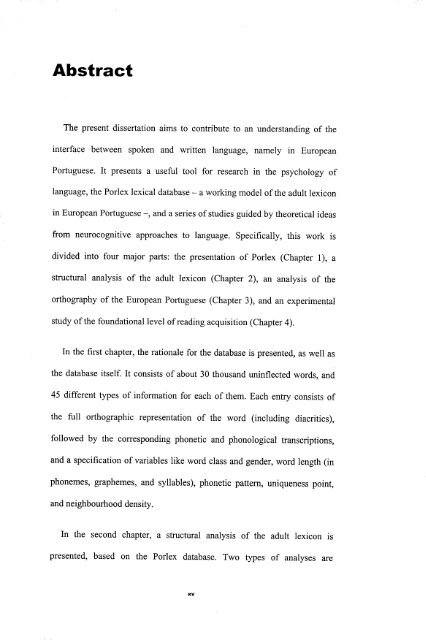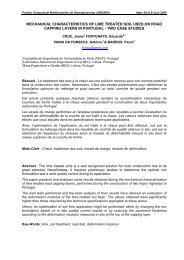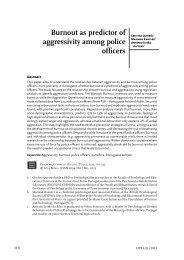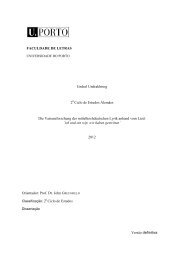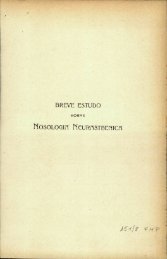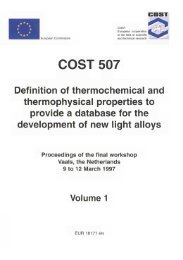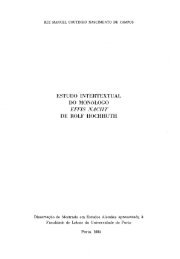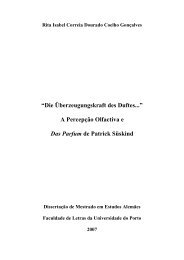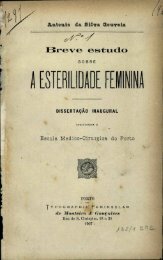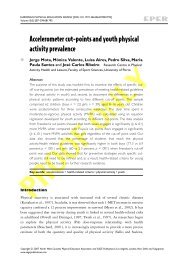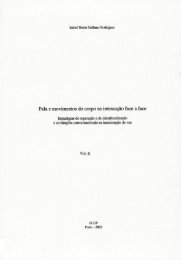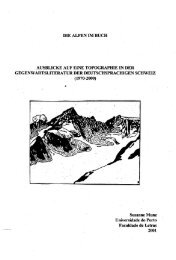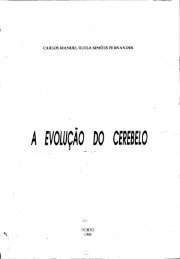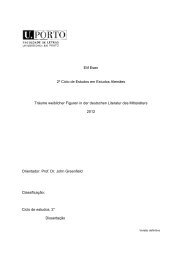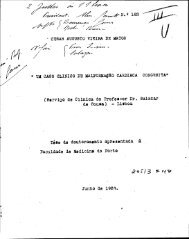- Page 1 and 2: UNIVERSIDADE DO PORTO Faculdade de
- Page 3 and 4: Tabela de Conteúdos Breve Volume I
- Page 5 and 6: TABELA DE CONTEÚDOS BREVE ♦ III
- Page 7 and 8: vi ♦ LER E ESCREVER EM PORTUGUÊS
- Page 9 and 10: viii ♦ LER E ESCREVER EM PORTUGU
- Page 11 and 12: Resumo O presente trabalho situa-se
- Page 13: RESUMO ♦ xiii um-para-um, e como
- Page 17 and 18: Résumé Le présent travail a pour
- Page 19 and 20: RÉSUMÉ ♦ xxi syllabes de tous l
- Page 21 and 22: xxiv ♦ LER E ESCREVER EM PORTUGU
- Page 23 and 24: 2 ♦ LER E ESCREVER EM PORTUGUÊS
- Page 25 and 26: 4 ♦ LER E ESCREVER EM PORTUGUÊS
- Page 27 and 28: 6 ♦ LER E ESCREVER EM PORTUGUÊS
- Page 29 and 30: 8 ♦ LER E ESCREVER EM PORTUGUÊS
- Page 31 and 32: 10 ♦ LER E ESCREVER EM PORTUGUÊS
- Page 33 and 34: 12 ♦ LER E ESCREVER EM PORTUGUÊS
- Page 35 and 36: 14 * LER E ESCREVER EM PORTUGUÊS E
- Page 37 and 38: 16 ♦ LER E ESCREVER EM PORTUGUÊS
- Page 39 and 40: Capítulo por|ex: Uma base lexical
- Page 41 and 42: PORLEX: UMA BASE LEXICAL INFORMATIZ
- Page 43 and 44: PORLEX: UMA BASE LEXICAL INFORMATIZ
- Page 45 and 46: PORLEX: UMA BASE LEXICAL INFORMATIZ
- Page 47 and 48: PORLEX: UMA BASE LEXICAL INFORMATIZ
- Page 49 and 50: PORLEX: UMA BASE LEXICAL INFORMATIZ
- Page 51 and 52: PORLEX: UMA BASE LEXICAL INFORMATIZ
- Page 53 and 54: PORLEX: UMA BASE LEXICAL INFORMATIZ
- Page 55 and 56: PORLEX: UMA BASE LEXICAL INFORMATIZ
- Page 57 and 58: PORLEX: UMA BASE LEXICAL INFORMATIZ
- Page 59 and 60: PORLEX: UMA BASE LEXICAL INFORMATIZ
- Page 61 and 62: PORLEX: UMA BASE LEXICAL INFORMATIZ
- Page 63 and 64: PORLEX: UMA BASE LEXICAL INFORMATIZ
- Page 65 and 66:
PORLEX: UMA BASE LEXICAL INFORMATIZ
- Page 67 and 68:
PORLEX: UMA BASE LEXICAL INFORMATIZ
- Page 69 and 70:
PORLEX: UMA BASE LEXICAL INFORMATIZ
- Page 71 and 72:
Morfologia PORLEX: UMA BASE LEXICAL
- Page 73 and 74:
PORLEX-. UMA BASE LEXICAL INFORMATI
- Page 75 and 76:
PORLEX: UMA BASE LEXICAL INFORMATIZ
- Page 77 and 78:
Frequência PORLEX: UMA BASE LEXICA
- Page 79 and 80:
PORLEX: UMA BASE LEXICAL INFORMATIZ
- Page 81 and 82:
PORLEX: UMA BASE LEXICAL INFORMATIZ
- Page 83 and 84:
PORLEX: UMA BASE LEXICAL INFORMATIZ
- Page 85 and 86:
PORLEX: UMA BASE LEXICAL INFORMATIZ
- Page 87 and 88:
PORLEX: UMA BASE LEXICAL INFORMATIZ
- Page 89 and 90:
PORLEX: UMA BASE LEXICAL INFORMATIZ
- Page 91 and 92:
PORLEX: UMA BASE LEXICAL INFORMATIZ
- Page 93 and 94:
PORLEX: UMA BASE LEXICAL INFORMATIZ
- Page 95 and 96:
PORLEX: UMA BASE LEXICAL INFORMATIZ
- Page 97 and 98:
PORLEX: UMA BASE LEXICAL INFORMATIZ
- Page 99 and 100:
PORLEX: UMA BASE LEXICAL INFORMATIZ
- Page 101 and 102:
PORLEX: UMA BASE LEXICAL INFORMATIZ
- Page 103 and 104:
PORLEX: UMA BASE LEXICAL INFORMATIZ
- Page 105 and 106:
PORLEX: UMA BASE LEXICAL INFORMATIZ
- Page 107 and 108:
PORLEX: UMA BASE LEXICAL INFORMATIZ
- Page 109 and 110:
PORLEX: UMA BASE LEXICAL INFORMATIZ
- Page 111 and 112:
PORLEX: UMA BASE LEXICAL INFORMATIZ
- Page 113 and 114:
PORLEX: UMA BASE LEXICAL INFORMATIZ
- Page 115 and 116:
PORLEX: UMA BASE LEXICAL INFORMATIZ
- Page 117 and 118:
PORLEX: UMA BASE LEXICAL INFORMATIZ
- Page 119 and 120:
PORLEX: UMA BASE LEXICAL INFORMATIZ
- Page 121 and 122:
PORLEX: UMA BASE LEXICAL INFORMATIZ
- Page 123 and 124:
PORLEX: UMA BASE LEXICAL INFORMATIZ
- Page 125 and 126:
PORLEX: UMA BASE LEXICAL INFORMATIZ
- Page 127 and 128:
PORLEX: UMA BASE LEXICAL INFORMATIZ
- Page 129 and 130:
PORLEX: UMA BASE LEXICAL INFORMATIZ
- Page 131 and 132:
PORLEX: UMA BASE LEXICAL INFORMATIZ
- Page 133 and 134:
PORLEX: UMA BASE LEXICAL INFORMATIZ
- Page 135 and 136:
PORLEX: UMA BASE LEXICAL INFORMATIZ
- Page 137 and 138:
Capítulo uma análise estrutural d
- Page 139 and 140:
UMA ANÁLISE ESTRUTURAL DO LÉXICO
- Page 141 and 142:
UMA ANÁLISE ESTRUTURAL DO LÉXICO
- Page 143 and 144:
UMA ANÁLISE ESTRUTURAL DO LÉXICO
- Page 145 and 146:
UMA ANÁLISE ESTRUTURAL DO LÉXICO
- Page 147 and 148:
UMA ANÁLISE ESTRUTURAL DO LÉXICO
- Page 149 and 150:
UMA ANÁLISE ESTRUTURAL DO LÉXICO
- Page 151 and 152:
UMA ANÁLISE ESTRUTURAL DO LÉXICO
- Page 153 and 154:
UMA ANÁLISE ESTRUTURAL DO LÉXICO
- Page 155 and 156:
UMA ANÁLISE ESTRUTURAL DO LÉXICO
- Page 157 and 158:
UMA ANÁLISE ESTRUTURAL DO LÉXICO
- Page 159 and 160:
UMA ANÁLISE ESTRUTURAL DO LÉXICO
- Page 161 and 162:
UMA ANÁLISE ESTRUTURAL DO LÉXICO
- Page 163 and 164:
UMA ANÁLISE ESTRUTURAL DO LÉXICO
- Page 165 and 166:
UMA ANÁLISE ESTRUTURAL DO LÉXICO
- Page 167 and 168:
UMA ANÁLISE ESTRUTURAL DO LÉXICO
- Page 169 and 170:
2.3.4 Variantes lexicais UMA ANÁLI
- Page 171 and 172:
UMA ANÁLISE ESTRUTURAL DO LÉXICO
- Page 173 and 174:
UMA ANÁLISE ESTRUTURAL DO LÉXICO
- Page 175 and 176:
UMA ANÁLISE ESTRUTURAL DO LÉXICO
- Page 177 and 178:
UMA ANÁLISE ESTRUTURAL DO LÉXICO
- Page 179 and 180:
UMA ANÁLISE ESTRUTURAL DO LÉXICO
- Page 181 and 182:
UMA ANÁLISE ESTRUTURAL DO LÉXICO
- Page 183 and 184:
UMA ANÁLISE ESTRUTURAL DO LÉXICO
- Page 185 and 186:
UMA ANÁLISE ESTRUTURAL DO LÉXICO
- Page 187 and 188:
UMA ANÁLISE ESTRUTURAL DO LÉXICO
- Page 189 and 190:
2.4.5 Acentuação UMA ANÁLISE EST
- Page 191 and 192:
UMA ANÁLISE ESTRUTURAL DO LÉXICO
- Page 193 and 194:
UMA ANÁLISE ESTRUTURAL DO LÉXICO
- Page 195 and 196:
UMA ANÁLISE ESTRUTURAL DO LÉXICO
- Page 197 and 198:
UMA ANÁLISE ESTRUTURAL DO LÉXICO
- Page 199 and 200:
UMA ANÁLISE ESTRUTURAL DO LÉXICO
- Page 201 and 202:
UMA ANÁLISE ESTRUTURAL DO LÉXICO
- Page 203 and 204:
UMA ANÁLISE ESTRUTURAL DO LÉXICO
- Page 205 and 206:
UMA ANÁLISE ESTRUTURAL DO LÉXICO
- Page 207 and 208:
UMA ANÁLISE ESTRUTURAL DO LÉXICO
- Page 209 and 210:
UMA ANÁLISE ESTRUTURAL DO LÉXICO
- Page 211 and 212:
UMA ANÁLISE ESTRUTURAL DO LÉXICO
- Page 213 and 214:
UMA ANÁLISE ESTRUTURAL DO LÉXICO
- Page 215 and 216:
UMA ANÁLISE ESTRUTURAL DO LÉXICO
- Page 217 and 218:
UMA ANÁLISE ESTRUTURAL DO LÉXICO
- Page 219 and 220:
UMA ANALISE ESTRUTURAL DO LÉXICO A
- Page 221 and 222:
UMA ANÁLISE ESTRUTURAL DO LÉXICO
- Page 223 and 224:
UMA ANALISE ESTRUTURAL DO LÉXICO A
- Page 225 and 226:
UMA ANÁLISE ESTRUTURAL DO LÉXICO
- Page 227 and 228:
UMA ANÁLISE ESTRUTURAL DO LÉXICO
- Page 229 and 230:
UMA ANÁLISE ESTRUTURAL DO LÉXICO
- Page 231 and 232:
UMA ANÁLISE ESTRUTURAL DO LÉXICO
- Page 233 and 234:
UMA ANÁLISE ESTRUTURAL DO LÉXICO
- Page 235 and 236:
UMA ANÁLISE ESTRUTURAL DO LÉXICO
- Page 237 and 238:
UMA ANÁLISE ESTRUTURAL DO LÉXICO
- Page 239 and 240:
UMA ANÁLISE ESTRUTURAL DO LÉXICO
- Page 241 and 242:
UMA ANÁLISE ESTRUTURAL DO LÉXICO
- Page 243 and 244:
UMA ANÁLISE ESTRUTURAL DO LÉXICO
- Page 245 and 246:
UMA ANÁLISE ESTRUTURAL DO LÉXICO
- Page 247 and 248:
UMA ANÁLISE ESTRUTURAL DO LÉXICO
- Page 249 and 250:
UMA ANÁLISE ESTRUTURAL DO LÉXICO
- Page 251 and 252:
UMA ANÁLISE ESTRUTURAL DO LÉXICO
- Page 253 and 254:
UMA ANÁLISE ESTRUTURAL DO LÉXICO
- Page 255 and 256:
UMA ANÁLISE ESTRUTURAL DO LÉXICO
- Page 257 and 258:
UMA ANÁLISE ESTRUTURAL DO LÉXICO
- Page 259 and 260:
UMA ANÁLISE ESTRUTURAL DO LÉXICO
- Page 261 and 262:
UMA ANÁLISE ESTRUTURAL DO LÉXICO
- Page 263 and 264:
UMA ANÁLISE ESTRUTURAL DO LÉXICO
- Page 265 and 266:
UMA ANÁLISE ESTRUTURAL DO LÉXICO
- Page 267 and 268:
UMA ANÁLISE ESTRUTURAL DO LÉXICO
- Page 269 and 270:
UMA ANÁLISE ESTRUTURAL DO LÉXICO
- Page 271 and 272:
UMA ANÁLISE ESTRUTURAL DO LÉXICO
- Page 273 and 274:
UMA ANÁLISE ESTRUTURAL DO LÉXICO
- Page 275 and 276:
UMA ANÁLISE ESTRUTURAL DO LÉXICO
- Page 277 and 278:
258 ♦ LER E ESCREVER EM PORTUGUÊ
- Page 279 and 280:
260 ♦ LER E ESCREVER EM PORTUGUÊ
- Page 281 and 282:
262 ♦ LER E ESCREVER EM PORTUGUÊ
- Page 283 and 284:
264 ♦ LER E ESCREVER EM PORTUGUÊ
- Page 285 and 286:
266 ♦ LER E ESCREVER EM PORTUGUÊ
- Page 287 and 288:
268 ♦ LER E ESCREVER EM PORTUGUÊ
- Page 289 and 290:
270 ♦ LER E ESCREVER EM PORTUGUÊ
- Page 291 and 292:
272 ♦ LER E ESCREVER EM PORTUGUÊ
- Page 293 and 294:
274 ♦ LER E ESCREVER EM PORTUGUÊ
- Page 295 and 296:
276 ♦ LER E ESCREVER EM PORTUGUÊ
- Page 297 and 298:
278 ♦ LER E ESCREVER EM PORTUGUÊ
- Page 299 and 300:
280 ♦ LER E ESCREVER EM PORTUGUÊ
- Page 301 and 302:
282 ♦ LER E ESCREVER EM PORTUGUÊ
- Page 303 and 304:
284 ♦ LER E ESCREVER EM PORTUGUÊ
- Page 305 and 306:
286 ♦ LER E ESCREVER EM PORTUGUÊ
- Page 307 and 308:
288 ♦ LER E ESCREVER EM PORTUGUÊ
- Page 309 and 310:
290 ♦ LER E ESCREVER EM PORTUGUÊ
- Page 311 and 312:
292 ♦ LER E ESCREVER EM PORTUGUÊ
- Page 313 and 314:
294 ♦ LER E ESCREVER EM PORTUGUÊ
- Page 315 and 316:
296 * LER E ESCREVER EM PORTUGUÊS
- Page 317 and 318:
298 ♦ LER E ESCREVER EM PORTUGUÊ
- Page 319 and 320:
300 ♦ LER E ESCREVER EM PORTUGUÊ
- Page 321 and 322:
302 ♦ LER E ESCREVER EM PORTUGUÊ
- Page 323 and 324:
304 ♦ LER E ESCREVER EM PORTUGUÊ
- Page 325 and 326:
306 ♦ LER E ESCREVER EM PORTUGUÊ
- Page 327 and 328:
308 ♦ LER E ESCREVER EM PORTUGUÊ
- Page 329 and 330:
310 ♦ LER E ESCREVER EM PORTUGUÊ
- Page 331 and 332:
312 « LER E ESCREVER EM PORTUGUÊS
- Page 333 and 334:
314 ♦ LER E ESCREVER EM PORTUGUÊ
- Page 335 and 336:
316 ♦ LER E ESCREVER EM PORTUGUÊ
- Page 337 and 338:
318 « LER E ESCREVER EM PORTUGUÊS
- Page 339 and 340:
320 ♦ LER E ESCREVER EM PORTUGUÊ
- Page 341 and 342:
322 ♦ LER E ESCREVER EM PORTUGUÊ
- Page 343 and 344:
324 ♦ LER E ESCREVER EM PORTUGUÊ
- Page 345 and 346:
326 ♦ LER E ESCREVER EM PORTUGUÊ
- Page 347 and 348:
328 ♦ LER E ESCREVER EM PORTUGUÊ
- Page 349 and 350:
330 ♦ LER E ESCREVER EM PORTUGUÊ
- Page 351 and 352:
332 ♦ LER E ESCREVER EM PORTUGUÊ
- Page 353 and 354:
334 ♦ LER E ESCREVER EM PORTUGUÊ
- Page 355 and 356:
336 ♦ LER E ESCREVER EM PORTUGUÊ
- Page 357 and 358:
338 ♦ LER E ESCREVER EM PORTUGUÊ
- Page 359 and 360:
340 ♦ LER E ESCREVER EM PORTUGUÊ
- Page 361 and 362:
342 ♦ LER E ESCREVER EM PORTUGUÊ
- Page 363 and 364:
Capítulo U m estudo sobre a aprend
- Page 365 and 366:
UM ESTUDO EXPERIMENTAL SOBRE A APRE
- Page 367 and 368:
UM ESTUDO EXPERIMENTAL SOBRE A APRE
- Page 369 and 370:
UM ESTUDO EXPERIMENTAL SOBRE A APRE
- Page 371 and 372:
UM ESTUDO EXPERIMENTAL SOBRE A APRE
- Page 373 and 374:
UM ESTUDO EXPERIMENTAL SOBRE A APRE
- Page 375 and 376:
UM ESTUDO EXPERIMENTAL SOBRE A APRE
- Page 377 and 378:
UM ESTUDO EXPERIMENTAL SOBRE A APRE
- Page 379 and 380:
UM ESTUDO EXPERIMENTAL SOBRE A APRE
- Page 381 and 382:
UM ESTUDO EXPERIMENTAL SOBRE A APRE
- Page 383 and 384:
UM ESTUDO EXPERIMENTAL SOBRE A APRE
- Page 385 and 386:
UM ESTUDO EXPERIMENTAL SOBRE A APRE
- Page 387 and 388:
UM ESTUDO EXPERIMENTAL SOBRE A APRE
- Page 389 and 390:
UM ESTUDO EXPERIMENTAL SOBRE A APRE
- Page 391 and 392:
UM ESTUDO EXPERIMENTAL SOBRE A APRE
- Page 393 and 394:
UM ESTUDO EXPERIMENTAL SOBRE A APRE
- Page 395 and 396:
UM ESTUDO EXPERIMENTAL SOBRE A APRE
- Page 397 and 398:
UM ESTUDO EXPERIMENTAL SOBRE A APRE
- Page 399 and 400:
UM ESTUDO EXPERIMENTAL SOBRE A APRE
- Page 401 and 402:
UM ESTUDO EXPERIMENTAL SOBRE A APRE
- Page 403 and 404:
UM ESTUDO EXPERIMENTAL SOBRE A APRE
- Page 405 and 406:
UM ESTUDO EXPERIMENTAL SOBRE A APRE
- Page 407 and 408:
UM ESTUDO EXPERIMENTAL SOBRE A APRE
- Page 409 and 410:
UM ESTUDO EXPERIMENTAL SOBRE A APRE
- Page 411 and 412:
UM ESTUDO EXPERIMENTAL SOBRE A APRE
- Page 413 and 414:
UM ESTUDO EXPERIMENTAL SOBRE A APRE
- Page 415 and 416:
UM ESTUDO EXPERIMENTAL SOBRE A APRE
- Page 417 and 418:
UM ESTUDO EXPERIMENTAL SOBRE A APRE
- Page 419 and 420:
UM ESTUDO EXPERIMENTAL SOBRE A APRE
- Page 421 and 422:
Considerações finais O acto de 1e
- Page 423 and 424:
CONSIDERAÇÕES FINAIS ♦ 405 nív
- Page 425 and 426:
CONSIDERAÇÕES FINAIS ♦ 407 Em s
- Page 427 and 428:
CONSIDERAÇÕES FINAIS ♦ 409 obse
- Page 429 and 430:
CONSIDERAÇÕES FINAIS ♦ 411 sobr
- Page 431 and 432:
Referências Academia das Ciências
- Page 433 and 434:
REFERÊNCIAS ♦ 415 Bumage, G. (19
- Page 435 and 436:
REFERÊNCIAS ♦ 417 Cutler, A. (Ed
- Page 437 and 438:
REFERÊNCIAS «419 Funnell, E., & H
- Page 439 and 440:
REFERÊNCIAS ♦ 421 Ladefoged, P.,
- Page 441 and 442:
REFERÊNCIAS ♦ 423 Melhoramentos.
- Page 443 and 444:
REFERÊNCIAS ♦ 425 Pinto, M. G. L
- Page 445 and 446:
REFERÊNCIAS ♦ 427 Spiegel, M. R.
- Page 447 and 448:
REFERÊNCIAS ♦ 429 Varela, F. (19
- Page 449 and 450:
Indice de Quadros CAPÍTULO 1 QUADR
- Page 451 and 452:
ÍNDICE DE QUADROS ♦ 433 QUADRO 2
- Page 453 and 454:
CAPÍTULO 3 ÍNDICE DE QUADROS ♦
- Page 455 and 456:
ÍNDICE DE QUADROS ♦ 437 QUADRO 7
- Page 457 and 458:
440 ♦ LER E ESCREVER EM PORTUGUÊ
- Page 459 and 460:
442 ♦ LER E ESCREVER EM PORTUGUÊ
- Page 461:
444 ♦ LER E ESCREVER EM PORTUGUÊ


